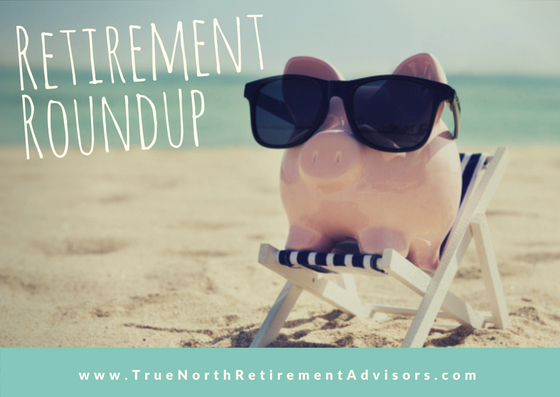
Articles and ideas to help you live a fulfilled and financially secure retirement!
In this month’s Retirement Roundup, we’ve curated our favorite articles from around the web to help you live a fulfilled and financially secure retirement!
We start off with a brief podcast from the Wall Street Journal – The Economic Year in Review. 2018 was a very strong year for the U.S. economy. The jobless rate reached a 49-year low, and tax cuts helped spark business investment and consumer spending.
Yet, signs of weakness in the economy – housing, rising interest rates (with the Fed raising rates four times in 2018), and uncertainty about a potential trade war with China – led to a rocky and disappointing year for the stock market. We also see what lies ahead in 2019…
Then, we continue with 10 CEO predictions for how business will change in 2019. Trends like weed branding, enforced diversity, and a brick-and-mortar retail comeback will shape the business climate in 2019, according to 10 CEOs.
Next, we switch gears and discuss the December government shutdown. We look back to previous shutdowns for some clues about how the current government shutdown might impact the stock market, and the conclusion might surprise you.
We then move on to a recent study which found that many Americans are making it up as they go with their retirement. Many couples nearing retirement aren’t in sync about their plans and goals, because many couples simply aren’t talking about their plans for retirement. We discuss some practical and fun ways to improve your communication about money with your partner.
From there, we feature an article from a self-made millionaire who retired at 37. He says everything you need to know about building wealth can be distilled down to two rules. Are you following these two rules?
Lastly, we find out how you can learn to negotiate better from a two-year-old. Toddlers are expert negotiators, and we look at how their tactics can be applied to your real-world negotiations.
Enjoy this month’s installment of the Retirement Roundup!
The Economic Year in Review
(What’s News – Audio Podcast | Wall Street Journal)
With strong job growth and record low unemployment in 2018, the U.S. economy kept humming along nicely in 2018, “despite ongoing trade tensions that threatened to derail progress”, according to the December 26, 2018 version of the Wall Street Journal “What’s News” podcast.
Looking back, 2018 was a very strong year for the U.S. economy. The jobless rate reached a 49-year low, and tax cuts helped spark business investment and consumer spending. Inflation is still low and the impacts of tariffs have been minimal.
Signs of weakness in the economy point to a slowdown in housing, rising interest rates (with the Fed raising rates four times in 2018), and uncertainty about a potential trade war with China.
Looking ahead, trade tensions still threaten continued economic growth, with a Wall Street Journal survey naming a potential trade war with China and the most likely derailment of the U.S. economy in 2019, according to a survey among economists.
In addition, Fed policy rattled the stock and bond markets’ nerves in 2018, even though the Fed raised rates as expected. One bright spot heading into 2019 is likelihood that the Fed will only raise rates twice in the new year.
With so many factors influencing the economy heading into 2019, it’s a time of heightened uncertainty, but we continue to remain positive about the economy in 2019, especially if trade tensions do not escalate into a full-blown trade war with China.
10 CEOs make predictions about how business will change in 2019
(Stephanie Vozza | Fast Company)
Fast Company surveyed 10 CEOs and asked them about their predictions for 2019. Here’s what they said:
- Further impact from #metoo, shaping policy and change in the workplace.
- Leadership skills will be tested, with more challenging economic conditions on the horizon.
- The trade environment will affect business, benefiting companies with a larger domestic presence.
- Trust and transparency are paramount, emerging more and more from the broken trust of consumer data breaches and privacy violations.
- Weed will get branding, with dispensaries providing an atmosphere and customer experience akin to a Napa Valley wine store.
- Experiences change the face of retail, with retailers finding ways to “transform transactions into unexpected experiences and stores into hubs of enrichment and places where people want to engage and connect,” according to Christine Barone, CEO of True Food Kitchen, an organic fast-casual restaurant chain.
- Diversity will become enforced. As “focus on gender and racial equality continues, the government will increasingly step in to legislate for change” as seen in places like California where public companies are now required to have at least one woman on their boards.
- Brick-and-mortar retailers fight back, and in a 180-degree turn, “2019 will see more brands shifting their focus to physical locations”, says Tom Buiocchi, CEO of ServiceChannel, a facilities management platform.
- “” becomes a thing, as companies will need to make decisions regarding the use of artificial intelligence with a respect for humanity in mind.
What do you think of these trends? Which emerging trend would you add to the list?
Personally, I’ve seen each of these trends materialize in some way in 2018, and it will be important to continue to monitor how changes in the economy, business, and politics will shape the business and investment climate in 2019 and beyond.
For further reading on trends for 2019, I encourage you to check out the book Non-Obvious 2019: How To Predict Trends And Win The Future by Rohit Bhargava
Do Government Shutdowns Affect the Stock Market?
(David Floyd | Investopedia)
The stock market took a beating the week before Christmas, as threats of a government shutdown became a reality on December 22nd, 2018. 400,000 federal workers will be without pay until a resolution is reached, and the shutdown will impact numerous government services.
Yet, shutdowns are nothing new, and it wasn’t even the first shutdown of 2018.
Which begs the question: How much does a government shutdown impact the stock market? Surprisingly, it has no impact whatsoever.
According to the article, “LPL Financial crunched the numbers for the previous 18 shutdowns, spanning the period from 1976 to 2013, and found that the median change in the S&P 500 over the course of a shutdown was 0.0%. Nothing. Utter apathy.”
This time around, there were additional factors influencing the stock market, with an interest rate hike and continued trade tensions with China leading to a December drop. It remains to be seen how much this shutdown will impact markets, but if history is any indication, a shutdown will be largely ignored by investors.
With retirement, many are making it up as they go
(Robert Weisman | Boston Globe)
Retirement today is definitely changing, as we highlight often in the Retirement Roundup. Many Americans are getting more creative about their retirement journey, and abandoning the “old notion of an orderly passage from the office to the golf links,” according to the article.
But what’s interesting about this article beyond changing retirement ideals, is that many Americans are “making it up as they go” with retirement. And they are doing so because of a lack of concrete goals and communication with their partner.
“Couples aren’t always on the same page. Many have no clue when they — or their partners — plan to retire,” according to the article.
To back up this assertion, Fidelity found in a recent survey that “4 in 10 of the couples it surveyed disagreed about what age each partner planned to retire. That included 1/3 of baby boomers nearing retirement or already in some phase of downshifting, unplugging, or cutting their ties with their employers,” according to the article.
Fidelity also found that “more than half [of the couples in the survey] weren’t aligned on how much they should save before they retired. 49% of responders, including 46% of boomers in or approaching retirement, said they had ‘no idea’ about how big they wanted their nest egg to be.”
If you’re married, one concrete way to stop making it up as you go is to communicate better with your spouse. Set aside time every quarter to discuss the current state of your finances, spending habits, debts, and assets, and progress toward your financial goals.
This may sound unappealing to many, but talking about money can be fun by reframing it as a “money date” – a quarterly date where you go out to dinner, drinks, coffee, or ice cream and check-in on your progress toward your goals as a couple.
Talking about your finances in a fun setting makes it a more pleasant experience, and hence, will make it more likely to actually happen! No more drudgery over spreadsheets and who is spending too much on Amazon. ????
Ron and Sue Cohen, both 66, and profiled in the article, didn’t talk much about retirement until last year, when Ron decided to leave his position as regional attorney for the National Labor Relations Board after 41 years in its Boston office.
“I didn’t really discuss it with my wife,” he admitted. “I told her a couple of months before. If she had spoken her mind, she might have said, ‘Do you really want to do this? Can we afford to do this?’”
If the couple had communicated more along the way, Ron’s retirement decision wouldn’t have been such a surprise for Sue, and they could have planned for it better.
I retired at 37 as a self-made millionaire, and I can tell you 99% of the advice you hear on getting rich can be boiled down into 2 rules
(Chris Reining | Business Insider)
Just two rules, huh? At first this sounds like click-bait, and Chris Reining might be over-simplifying, but his two rules for building wealth are quite insightful.
He says that “It’s usually not the lack of resources available, it’s the lack of resourcefulness that stops you from reaching your financial goals.”
Reining decided he needed to be more resourceful if he was going to retire early, so here’s what he found out about millionaire habits, and then implemented in his own life to retire at the age of 37:
Rule 1: Spend what’s left after investing.
If you save automatically in your 401k or other investment accounts, you are already implementing this rule. He emphasizes that you will adjust to living on less when you spend after you save, “And over time you can increase the amount you invest to 10%, 15%, even more.”
Implementing the save first mindset and increasing your savings rate over time is how the average Joe can become wealthy. It takes consistency and patience, but he says, “you’ll feel like a genius when you finish”.
Rule 2: Make big purchases small.
In other words, spend less on big ticket items like houses and cars. Just because you can technically afford something, doesn’t mean you should buy it, which is a mistake that a lot of people make.
This leads to too many Americans getting approved for and taking on car loans and mortgages that suffocate them in too much debt and make it impossible to accomplish Rule 1, above.
Reining emphasizes: “Look, I’m not saying don’t buy the things you want, what I’m saying is that the reason people don’t have bigger bank accounts is because the idea of spending beyond your means is probably as old as money itself. It’s easy to go with the flow, valuing what society tells you to value. Usually that leads to overspending and not investing for your future.”
If you can be resourceful, patient, and disciplined while ignoring the societal pressure to spend, spend, spend, then it’s much simpler to get rich.
Negotiate Better: Surprising Insights From A Two-Year-Old
(Aaron Michel | Forbes)
Even though they lack formal training and must rely on gut-instinct alone, two-year-olds are expert negotiators. I know this first-hand, as I have a 4-year-old and a 15-month-old who are both very adept at getting what they want.
The author of the article says he has learned three strategies from his 2-year-old toddler negotiator, that you can apply to the real world:
- Use time to your advantage.
“Time means nothing to a toddler, but parents have things to do.” The author relays a story about mealtime battles: “She could wait forever. And by choosing to wait, she put the burden on our shoulders to solve her problem. We ultimately gave her the new pasta along with broccoli, which she loves. She used time to push us toward a position that was more attractive to her.”
If you can better understand how time influences each party at the negotiation table, you can use that to your advantage.
- Be strategically unyielding
Toddlers are very persistent. They will often keep nagging you until you give them what they want or offer them another solution. “No ice cream…but you can have a cookie instead.” Bingo!
The toddler didn’t exactly get what they wanted, but by sticking to their guns, they still got the cookie, which is better than nothing.
According to the article, “the learning here is that in certain business negotiations, being strategically unyielding can push your negotiating partner to try to come up with an alternative solution to your problem.”
- Employ tactical silence
Toddlers don’t like doing a lot of things. Most little kids want to stay up later, and many know how to use tactical silence to get their way. If I say to my daughter: “Keegan, time for bed in 10 minutes,” I usually get silence, and if I press her…eye contact.
This non-response is a delay tactic, designed to delay negotiations until bedtime, when she will put up a fight, and by doing so, delay bedtime.
According to the author, “the important takeaway for businesses here is that at least two parties are necessary for a negotiation. If delay serves you better than negotiating now, then delay. Wait until the timing is right to negotiate.”
THANKS FOR READING!
Did you enjoy reading this? Do you want more content like this delivered to you each week?
Related Posts:
-
THE BIGGEST TAX LAW CHANGE SINCE THE 80’S – AND WHAT IT MEANS FOR YOU!
-
HOW TO KEEP YOUR COOL IN A BEAR MARKET
-
401(K) CONTRIBUTIONS WILL GO UP IN 2019
Disclosure:
The views outlined in this newsletter are those of True North Retirement Advisors (TNRA) and should not be construed as individualized or personalized investment advice or tax advice. TNRA are not licensed tax consultants, please contact your CPA for advice on your specific tax situation. Any economic and/or performance information cited is historical and not indicative of future results. Economic forecasts set forth may not develop as predicted.
Different types of investments involve varying degrees of risk, and there can be no assurance that the future performance of any specific investment, investment strategy, or product made reference to directly or indirectly, will be profitable, equal any corresponding indicated historical performance level(s), or be suitable for a given client or portfolio.
Investing in stocks includes numerous specific risks including the fluctuation of dividend, loss of entire principal and potential illiquidity of the investment in a declining market. Bonds are subject to market and interest rate risk if sold prior to maturity. Bond and bond mutual fund values and yields will decline as interest rates rise and bonds are subject to availability and change in price.
Any questions regarding the applicability of any specific issue discussed above should be addressed with TNRA. All information, including that used to compile charts and/or tables, is obtained from sources believed to be reliable, but TNRA has not verified its accuracy and does not guarantee its reliability.
Moreover, you should not assume that any discussion or information contained in the newsletter serves as the receipt of, or as a substitute for, personalized investment advice from TNRA or from any other investment professional. To the extent that you have any questions regarding the applicability of any specific issue discussed above to your individual situation, you are encouraged to consult with TNRA or the professional advisor of your choosing. All information, including that used to compile charts, is obtained from sources believed to be reliable, but TNRA has not verified its accuracy and does not guarantee its reliability.



